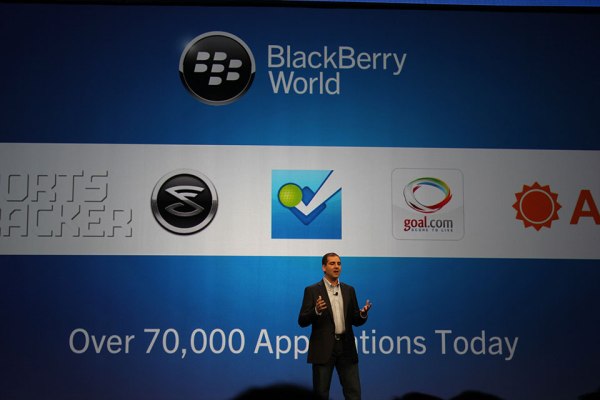BlackBerry’s platform has seen some big-name additions in the past couple of days. Unfortunately both came via sideloaded Android apps, likely created by the community using BlackBerry developer tools and the APKs of the Android apps in question. BlackBerry has made it very easy for any developer to port their Android titles to BB10 in around five to 10 minutes, but that means it’s easy for anyone motivated enough to do so as well.
I spoke to BlackBerry’s VP of Developer Relations Alec Saunders about the recent surfacing of both an Instagram BAR file for sideloading on BB10 devices (which Chris wrote about yesterday) and the Netflix app that BlackBerry OS demoed today. Saunders made clear that BlackBerry doesn’t officially sanction conversion efforts from anyone other than the official developer behind an app.
“We don’t condone piracy,” Saunders said. “If you don’t have a license to distribute that app, that’s effectively what it is. We think the best way for a developer to deal with that is to package the application themselves, turn it into a BAR file and put it into BlackBerry World, because users wouldn’t be tempted to do that if the applications were simply available in BlackBerry World.”
Saunders sees the eagerness of the community to get applications like Instagram and Netflix working on BB10 devices as a sign that there’s demand there, and he thinks it is beginning to sway companies around to BlackBerry’s side, too. WhatsApp is working on a BlackBerry port for its cross-platform messenger, for instance, and The New York Times is also working on a dedicated BB10 app. Saunders said both of those decisions have been made within the last six weeks, so clearly some minds are changing in terms of developer hold-outs.
“It is really, really easy to build a BAR file for an Android application and upload that to the store, so if it’s easy for a developer to do that, it’s easy for users to do that, too,” Saunders said, discussing what BlackBerry can do about user-created apps. Only when those try to come into BlackBerry World itself and masquerade as legitimate apps can the company take action.
I also asked Saunders whether or not BlackBerry expected or predicted users would take matters into their own hands, since it works nicely as a stopgap measure while companies build their own solutions and helps prove there’s a demand out there for those products. “I wouldn’t say we predicted it,” he said. “And certainly we haven’t made it easier for users to sideload applications on to our platform, but we’ve been aware of it for some time.”
The home port crowd is an interesting variable in RIM’s platform launch. It energizes the community, generates hype around apps that aren’t yet committed to the platform, and shows off the ease with which Android APKs can be ported. BlackBerry may not officially approve, but it’s hard not to see the value of this kind of guerrilla tactic in an admittedly uphill battle.
